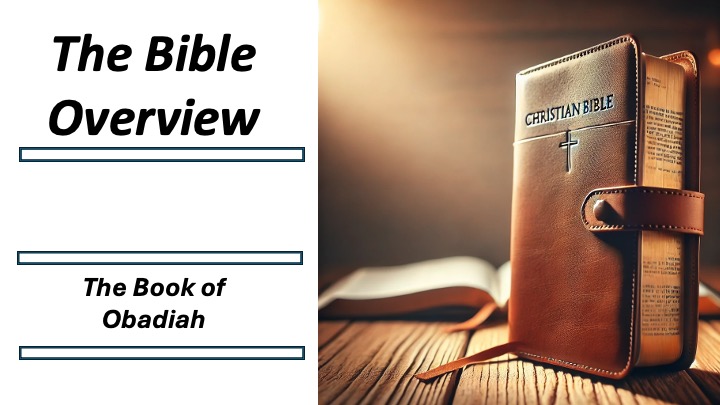Bible Overview Obadiah
Mike Ervin

OBADIAH
STUDY OVERVIEW
1. AUTHORSHIP AND DATE
Traditional View:
• Obadiah is attributed to the prophet Obadiah, whose name means “servant of
Yahweh.”
• Traditionally, he is considered a prophet of Judah, but little is known about
him.
• The book is often dated to circa 850–840 BCE, during the reign of Jehoram (2
Chr. 21:8-20), when Edom rebelled against Judah.
Modern Scholarly View:
• Many scholars date Obadiah to the 6th century BCE, after the fall of
Jerusalem (586 BCE).
• The book reflects Edom’s participation in or celebration of Jerusalem’s
destruction, fitting the context of Babylon’s conquest.
• Some suggest Obadiah may have been compiled later, incorporating earlier
prophetic material.
2. INTENDED AUDIENCE
• Primarily addressed to Judah, offering hope amid destruction and exile.
• Also serves as a warning to Edom, condemning their hostility toward Israel.
• Reaffirms God’s justice and future restoration for His people.
3. MAJOR THEMES
1. Judgment Against Edom – God condemns Edom’s pride, violence, and betrayal of
Judah.
2. The Day of the Lord – A theme of divine justice, where nations reap what
they sow.
3. God’s Sovereignty – God rules over nations and ensures justice prevails.
4. Restoration of Israel – Despite exile, Judah will be restored, and God’s
kingdom will triumph.
4. SEQUENTIAL CHAPTER REVIEW (Obadiah has only one chapter: 21 verses)
I. Judgment on Edom (Obadiah 1–14)
• Vv. 1–4: Edom’s arrogance and false security exposed.
• Vv. 5–9: Total destruction prophesied for Edom.
• Vv. 10–14: Edom’s sins—violence and betrayal of Judah—detailed.
Key Takeaway: Edom’s downfall is inevitable because of their mistreatment of
Judah.
II. The Day of the Lord and Israel’s Restoration (Obadiah 15–21)
• Vv. 15–16: The “Day of the Lord” will bring judgment on all nations,
including Edom.
• Vv. 17–21: Israel’s future restoration and dominion over Edom; God’s kingdom
prevails.
Key Takeaway: Judgment is universal, but God’s people will be restored.
CONCLUSION
• Obadiah is the shortest book in the Old Testament, yet it delivers a powerful
message of justice and hope.
• It highlights the fate of prideful nations and the ultimate triumph of God’s
kingdom.
• Its message remains relevant, emphasizing divine justice, humility, and trust
in God’s promises.